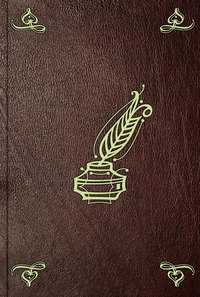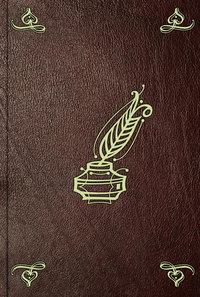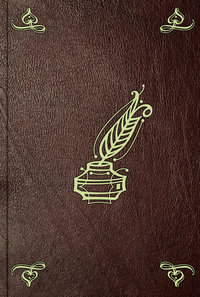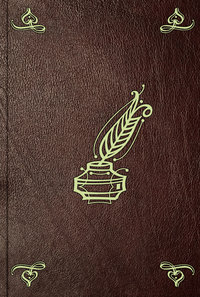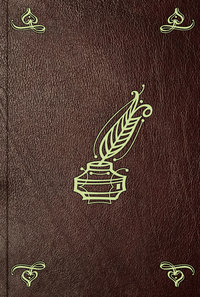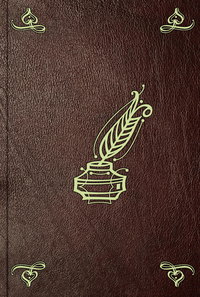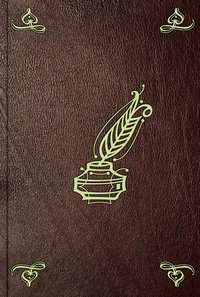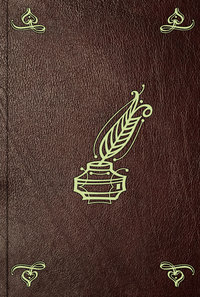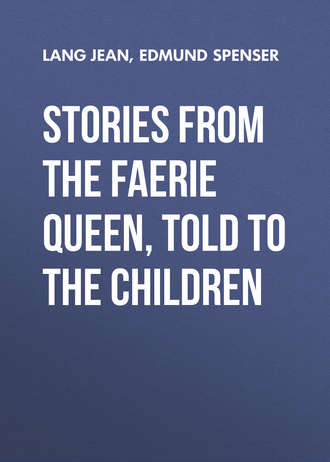 полная версия
полная версияStories from the Faerie Queen, Told to the Children
When he was quite strong once more, he went from the House of Holiness to a place where an old hermit stayed, and from him George learned still more of what was good.
George had always thought that he was a fairy’s son, but the hermit told him the story of how the bad fairy had stolen him from his father’s castle when he was a baby. And although George loved his Faerie Queen and the fairy knights and ladies, he was glad to think that he was the son of an English king.
The old man told him that if, all through his life, he was true, and brave, and merciful and good, one day he should be called a saint. And he would be the saint who belonged especially to all Englishmen and Englishwomen, and to English boys and girls.
‘Saint George shalt thou callèd be,Saint George of Merry England, the sign of victory.’Then did George, his shining armour with its red crosses, and his sharp sword and glittering spear buckled on again, ride away once more with Una, to kill the dragon and set free the king and queen.
It was a dreary country that they rode through, for the dragon had laid it all waste, but from far away they saw the tower of brass shining in the sun.
As they drew nearer they saw a watchman on the top of the tower gazing across the plain. Day after day for a long, long time he had looked for Una to come back with a knight to slay the dragon. When he saw Una and George crossing the plain, he ran and told the king and queen, and the old king climbed up to the top of the tower to see for himself that the good news was true.
As they drew near the tower, George and Una heard a hideous roaring sound. It filled all the air and shook the ground like an earthquake. It came from the dragon, that was stretched out in the sun on the side of a hill.
When it saw the knight in gleaming armour riding towards it, it roused itself joyfully up to come and kill him, as it had killed all the other knights.
George made Una go to a high piece of ground, from whence she could see the fight, and where she would be out of danger, and then rode to meet the terrible beast.
Half running and half flying, with its great ugly wings, the dragon came swiftly towards him. It was so big that its shadow looked like the dark shadow of a mountain on a valley. Its body was monstrous and horrible and vast, and was all swelled out with rage. It had scales all over it that shone like brass, and that were as strong as steel. Its wings were like big sails, and when it flapped them and clashed its scales, the sound was like the sound of a great army fighting. Its long tail was spotted red and black, and at the end of it two sharp stings stuck out. It had cruel long claws, and its gaping jaws had each three rows of iron teeth, all stained and wet with the blood of the people it had eaten last. It had eyes like flames, and its breath was fire and smoke.
When it rushed at George, George rode hard at it with his spear. But no spear was ever made that was strong enough to pierce that dragon’s scales. The spear glanced off from its ugly, speckled breast, but the dragon, furious at the hard thrust that George had given him, lashed out with its tail so furiously that both the horse and his rider were thrown to the ground. Lightly they rose up again, and again George smote with his spear.
Then the dragon, spreading its wings, rose from the ground like a giant bird, and seizing George and his horse in its claws, flew away with them. Right across the plain it flew, then, finding them heavy, it dropped them on the ground. As it did this, George thrust with his spear under the dragon’s stretched-out wing, and made a great gaping wound. The spear broke, but the spear-head stuck in the wound, until the dragon, mad with rage and pain, plucked it out with its teeth.
Then did fire and smoke rush out more terribly than before from the jaws of the furious dragon. It lashed its long tail so savagely that it folded in its coils George’s foaming horse. The frantic horse, in its struggles to get free, threw George on the ground amongst the horrible blood. But George sprang to his feet, and with his sharp sword struck again and again at the dragon’s head. The sword could not pierce it, but the dragon, annoyed at George’s fierce attack, thought it would fly out of his reach. But when it tried, the wound George had made in its wing prevented it.
Then its rage at George grew fifty times more furious. It roared till the whole land shook, and it sent out from its inside such blazing flames that George’s face was scorched and his armour grew so hot that it burned into his flesh.
George was so tired and so faint and sore, that when he was burned as well, he feared that the end had come. The dragon saw his faintness, and smiting him a tremendous blow with its great tail, it threw him down, and George fell backwards into a pool of water. Now this pool of water was a magic spring. When George fell into it, all his faintness and weariness vanished.
Una, who feared he was dead, saw him spring out of the water even fresher and stronger than he had been at the beginning of the fight.
The dragon could not believe its eyes, and thought that George must be a new knight who had come to fight it.
Before it had got over its surprise, George struck its head so fiercely with his sword, which still dripped from the magic water, that he made a great wound.
The dragon, roaring like a hundred lions, struck at George with the stings on the end of its tail. One of them went right through George’s shield, and through his armour, and firmly stuck in his shoulder. Though George was faint with the pain it caused, he hit the dragon’s tail such a blow that he hewed off five joints and left only the ugly stump.
Mad with rage, the dragon, belching out smoke and fire, and giving fearful cries, seized George’s silver shield in its claws and tried to drag it from him. Again and again, and yet again, George struck at it with his sword. At last he hit the joint and cut the paw clean off. Even then, so tight was the grip that the claws had got, that it still hung bleeding from the shield.
Then was the dragon’s rage so frightful, that the flames and smoke from its mouth were like the flames and smoke that pour out of a burning mountain. All the sky was darkened, and as George shrank back in horror from the burning, choking, smelling darkness, his foot slipped in the mire, and he fell.
Now there grew in that land a magic tree, all hung with fruit and rosy apples. From the trunk of the tree there flowed a little stream of sweet balm that could cure even deadly wounds and make weak people strong. The dragon was afraid of this tree and its magic stream, and dared not go near it.
All night George lay as if he were dead, and Una, on the hillside, waited with a heavy heart for morning to come.
He lay so close to the magic tree that the dragon dared not come near him, but it thought that he must have died of his wounds.
When the black night had rolled away and daylight spread over the land, George arose from his sleep. His wounds were all healed by the magic balm, and he was stronger than before.
When the dragon rushed at him with its great fierce mouth gaping wide, George thrust his sword down its throat and wounded it so terribly that it rolled over like a huge mountain in an earthquake. The ground shook as it fell, and the last breaths that it drew stained the beautiful morning sky, like smoke from a furnace.
At first it seemed to Una too good to be true that the dragon was dead. But when the last of the black smoke had cleared away, and the monster lay quite still, she knew that George had won the fight and slain the dragon.
The watchman on the brazen tower had also seen the dragon fall, and so the king had the gates of brass, that had been closed for so long, thrown wide open.
With sounds of trumpets and shouts of joy the king and queen and their people came out to greet George and Una, and to thank George, who had saved them and their land from the horrible dragon.
The people crowded round the dead body of the monster. The children wished to look at it closely, and when a bold little boy took hold of its claws, his mother screamed with fright, and dragged him back. So long had they been in terror of their savage enemy, that even when it lay dead they still feared that it might do them some harm.
There never was a happier wedding than the wedding of Una and George, the Red Cross Knight, nor was there ever any bride more beautiful than Una.
Her dress was spotless, like a white lily. It was not made of silver nor silk, yet like silver and silk it shone and glistened. Her golden hair hung round her happy face, and her face was like the freshest flower of May.
Fairy music rang through the air, and there was nothing but happiness in the land on the day that Una wedded brave George of Merry England.
III
BRITOMART AND THE MAGIC MIRROR
Long years ago there lived a beautiful princess whose name was Britomart.
When she was a little girl she did not care to play with dolls nor to sew, but she loved to ride and to play boys’ games. And when she grew older she learned to fight with spears and swords like the knights at her father’s court.
Now a great magician called Merlin had once given a wonderful gift to the king, Britomart’s father.
It was a magic mirror, that looked like a ball of the clearest crystal.
When the king looked in this mirror he saw all that was going to happen to him, and which of his friends were false and which true. There was no hidden secret which that crystal ball could not tell.
One day Britomart went into her father’s room and looked into his magic mirror.
‘What shall I wish to see?’ she asked of herself.
Then she thought, ‘Some day I shall marry. I should like the crystal ball to show me what my husband will be like.’
Even as she thought this, she saw, like a moving picture, a knight riding across the crystal.
He was tall and broad and strong, and looked very brave. The front of his shining helmet was drawn up, and from under it looked out the handsome face that his friends loved and his foes feared. He wore beautiful armour, all inlaid with gold, and she knew what his name was, and that he had won this armour in a fight with another great knight, for on it was written:
‘Achilles’ armes which Artegall did win.’From that day Britomart could think of nothing but the knight whose picture had ridden across the mirror and vanished away.
She grew thoughtful and sad, and could not sleep, for she feared it was a dreadful thing to love a shadow.
Her old nurse slept in her room, and at night when she heard Britomart tossing about in bed and softly crying to herself, the old woman was very unhappy. Night after night she heard her, till she could bear it no longer. She asked Britomart what was wrong, and Britomart sobbingly told her.
Then the good old nurse comforted Britomart. She said she was sure that Artegall must be a real man, and not just a shadow, and that she would find him. Then she tucked the bedclothes round Britomart, and put out the flickering lamp. When Britomart, much comforted, had fallen quietly asleep, her nurse sat and watched beside her, and dropped some tears because Britomart was no longer a little baby-girl for her to take care of, but a grown-up girl who loved a knight.
Next day the old nurse went to the woods and gathered all sorts of herbs. She boiled them down together, and mixed them with milk and other things, and put them in an earthen pot. Round the pot she bound three of her hairs plaited together. Then she said a charm over the pot, and made Britomart turn round and round and round about it. She thought that this charm would cure Britomart of loving the knight, and make her gay and happy again. But the old nurse’s charm was no good. Britomart grew thin and sad and ill.
Then the old woman thought of Merlin, the magician who had made the mirror.
‘It is all his fault that my princess is so sad,’ she said; ‘he must make her happy again.’
So she dressed Britomart and herself in shabby old clothes, and went to seek Merlin.
The magician lived in a dark cave under a rock. The rock lay near a swift-rushing river that ran down between thickly wooded hills. Hollow, fearful sounds, and a clanking, as of chains, were always heard there.
When Britomart and her nurse reached the lonely cave, and heard the noise of moans and groans and clanking chains, they were too frightened at first to go in. But at length they plucked up courage and entered the cave, and found Merlin writing magic words on the dark floor. He knew very well, although they wore shabby old clothes, that his visitors were the Princess Britomart and the princess’s nurse. But he pretended that he did not know them, and asked them what they wanted.
‘Three moons have come and gone,’ said the nurse, ‘since this fair maid first turned ill. I do not know what ails her, but if you cannot cure her, she will die.’
Merlin smiled.
‘If that is all you want,’ he said, ‘you had better take her to a doctor.’
‘If any doctor could have done her good,’ said the nurse, ‘I should not have troubled you. But I fear that a witch or a wicked fairy must have bewitched her.’
Then Merlin burst out laughing.
‘Why do you go on pretending to me?’ he said. ‘I know all about it. This is the beautiful Princess Britomart, and you are her nurse.’
At that Britomart blushed rosy red, but the nurse said:
‘If you know all our grief, then have pity on us, and give us your help.’
Then Merlin told Britomart not to be sad, for Artegall was a real living knight, and one of the bravest and noblest that lived. His home was in Fairyland, but he was a king’s son that the fairies had stolen away when he was a baby.
‘You shall marry Artegall,’ said the magician, ‘and bring him back from Fairyland to his own country, where he shall be king.’
Then he gave her much advice, and told her of the great things that should be done in the days to come by the sons that were to be hers and Artegall’s.
And Britomart and her nurse, with happy hearts, came away from the magician’s gloomy cave.
‘But how shall we seek my knight?’ asked Britomart of her nurse. ‘How shall we find him?’
The nurse said: ‘Let us dress ourselves in some of the armour that your father has taken from his enemies. You shall be a knight, and I will be your squire. Together we will ride to Fairyland and find Artegall.’
When Britomart was dressed in shining armour of silver and gold, she looked a very handsome, tall, young knight. Her nurse dressed her as carefully as she had dressed her long ago in her baby-clothes, and, when all her armour was on, she put into her hand a long spear. It was a magic spear, and there had never yet been born a knight who could sit on his saddle when it struck him.
In the silent night they got on their horses and rode away, no longer a princess and her nurse, but a gallant knight and a little old squire, who seemed to find his big shield much too heavy for him.
Before Britomart and her nurse had ridden very far, they saw two knights riding towards them. These were Guyon and the Red Cross Knight.
Guyon rode furiously at Britomart, but Britomart rode as furiously at him with her magic spear. And, for the first time in his life, Guyon found himself thrown from his horse and sitting heavily down on the ground. He was very much ashamed and very angry, and would have rushed at Britomart with his sword. But the old palmer, who was with him, calmed his rage, and he made friends with Britomart. And for some time Britomart and those two brave knights rode on together, and shared fights and adventures.
One day as they rode together, Britomart asked the Red Cross Knight if he knew a wicked knight called Artegall.
‘He is not a wicked knight,’ said the Red Cross Knight angrily. ‘He is one of the bravest and the best.’
Britomart was so glad to hear him say this of Artegall, that she could scarcely hide her joy. But she went on pretending that she thought Artegall bad and cruel, just that she might hear his friend praise him.
‘There is no knight more brave than Artegall,’ said the Red Cross Knight. ‘Ladies who suffer wrong, and little children who have none to care for them, are always sure of having Artegall to fight for them. He is as good as he is brave, and as brave as he is good.’
Britomart loved the Red Cross Knight because he was so true to his friend, and more than ever she loved Artegall, the knight of the Mirror.
Presently her way and that of the Red Cross Knight parted, and she rode on with her squire until they came to the sea-shore.
The sea was beating against the rocks, and moaning as it cast itself against the high crags.
Britomart made her old nurse unlace her helmet, and sat down and watched the cold grey waves.
‘I feel like a little boat beaten about by the sea,’ she said. ‘When shall I ever reach my harbour, and find the knight I seek?’
For a long time she sat, sadly thinking. But at last she saw a knight cantering along the sand, and quickly put on her helmet and leaped on her horse, and rode to meet him.
He was a bold knight, and told her to fly, or he would kill her.
‘Fly!’ proudly said Britomart. ‘Words only frighten babies. I will not fly. I will fight you!’
Then they fought, and with her spear Britomart gave the knight a terrible wound, and rode away, leaving him lying senseless on the shore.
Many other fights had Britomart as she sought Artegall, and always her magic spear made her the winner.
One day she came to a place where a great many knights were having a tournament.
A beautiful golden girdle, sparkling with jewels, was to be the prize for the knight that fought the best.
For three days they had fought and fought, until the ground was strewed with broken spears and swords.
On the last day of the tournament a stranger knight had appeared. His armour did not shine with silver and gold like those of the other knights, but looked like an old tree all overgrown with moss. His horse was decked with oak-leaves, and he carried a battered old shield.
‘The Savage Knight,’ the others called him, and they would have laughed at him and his shabby armour, had he not fought so well. All day long he fought, and one knight after another he threw wounded or dead on the ground. At sunset they feared him as they might have feared a fierce lion, and none dared stand against him.
Just then Britomart rode up with her golden armour gleaming against the sunset sky.
She couched her spear and rode at the Savage Knight, and threw him to the ground.
The other knights then all rode at her, but them, too, she threw down with her magic spear.
So they had to own that Britomart was the victor, and had won the golden girdle.
Now the Savage Knight was not really a savage knight. He was no other than Artegall, the knight of the Crystal Ball.
Artegall was so ashamed, and so angry with Britomart for having thrown him from his horse, that when the tournament was over, he rode away to a wood, through which he knew that Britomart must pass.
‘The stranger knight with his magic spear shall fight me once again,’ he angrily said, ‘and this time he shall not be the victor.’
Presently, as he sat under the trees, and watched his horse grazing, he saw Britomart riding up, brave and fearless, in her golden armour.
Artegall sprang on his horse, and furiously rode at Britomart with his steel-headed lance. But, in the twinkling of an eye, he found himself lying on the turf, again unseated by the magic spear.
He rushed at Britomart then with his sword, and cut and thrust at her so savagely that her horse backed away from him. At last he struck a great blow at her head, and the sword, glancing down her armour, struck her horse with such force on its back that it fell to the ground, and Britomart had to jump off. She threw aside her spear and furiously smote Artegall with her sword. She cut his armour through, and wounded him so deeply that blood from his wound streamed to the ground. The blows from Artegall’s sword fell on her like hail, but she struck him as fiercely as he struck her. The grass got trampled down and stained with blood, yet still they smote and thrust and smote again.
At last Artegall grew very tired, and Britomart was more tired still. When Artegall saw how tired she was, he gathered up all his strength and struck her a terrific blow, hoping to kill her quite. But the blow only sheared off the front part of her helmet, and left her face uncovered.
And as Artegall’s arm rose again for another deadly stroke, it stopped short in the air. For instead of the grim face of the fierce knight he thought he was fighting, there looked out a face that Artegall thought was the loveliest he had ever seen.
Britomart’s cheeks were hot and pink, and her hair, that was so long that it reached her feet, had burst from its band and framed her fair face like a golden frame.
The sword slipped from Artegall’s fingers to the ground. He knelt at Britomart’s feet and begged her to forgive him for having treated her so roughly.
But Britomart was still angry with him for that last fierce stroke of his.
‘Rise!’ she said, ‘or I shall kill you!’ and she held her sword over his head.
But Artegall would not rise, but only prayed her the more earnestly to forgive him.
Then the old nurse drew near and begged Britomart to have a truce.
‘Rest yourself for a little,’ she said, ‘and let the Savage Knight rest too.’
Britomart agreed, and the knight raised the front of his helmet that he might breathe more freely.
When Britomart saw his face, so handsome and so brave, she knew at once that the Savage Knight that she had tried to kill was Artegall, the knight of the Mirror.
Her arm dropped, and her sword fell from her hand.
She tried to speak roughly to him, but her tongue would not say the words.
Together they rode off to a castle, where they stayed till they were rested and their wounds were healed.
And each day that they were together Artegall loved Britomart more and more, until at last he could stay no longer silent, but told her that he loved her more than all the world.
So it was that the beautiful princess Britomart found her husband, the gallant knight of the Magic Mirror.
IV
THE QUEST OF SIR GUYON
Long ago, on the first day of every year, the Queen of the Fairies used to give a great feast.
On that day all the bravest of her knights came to her court, and when people wanted help to slay a dragon or a savage beast, or to drive away a witch or wicked fairy, they also came and told their stories.
To one of those feasts there came an old palmer dressed in black. His hair was grey, and he leaned heavily on his long staff. He told a sad tale of the evil things done in his land by a wicked witch.
The Faery Queen turned to Guyon, one of the bravest and handsomest of her young knights. ‘You shall go with this old man and save his land,’ she said to him.
‘I am not worthy,’ said Sir Guyon, ‘but I will do your bidding and my best.’
So he rode away with the palmer. His good horse had never paced so slowly before, for Guyon made him keep step with the feeble old man.
It was not possible to go far from the fairy court without having fights and adventures, but in every fight Guyon was the victor, because he listened to what the good old palmer said, and did not think that he himself knew better.
One day they came to a wide river on which floated a little boat, all decked out with green branches. In it sat a fair lady, who sang and laughed and seemed very happy and very gay. She was a servant of the wicked witch for whom Guyon was looking, but this Guyon did not know. She offered to ferry Guyon across the river, but she said there was no room in her boat for the palmer.
Guyon thought she looked so pretty and merry, and so kind, that he gladly went with her.
Together they gaily sailed down the river. When the birds sang, she sang along with them, and when little waves gurgled and laughed against the side of the boat, she laughed too.
But soon Guyon found that she was not really good, and he loved her gay laugh no longer, and presently left her and wandered on alone in the island to which she had brought him.
At last he came to a gloomy glen where trees and shrubs grew so thickly that no sunlight could get in. Sitting there in the darkness he found a rough and ugly man. His face was tanned with smoke and his eyes were bleared. Great heaps of gold lay about him on every side. When he saw Guyon, he dashed in a great fright at his money, and began to try to pour it into a hole and hide it, lest Guyon should steal it from him.


